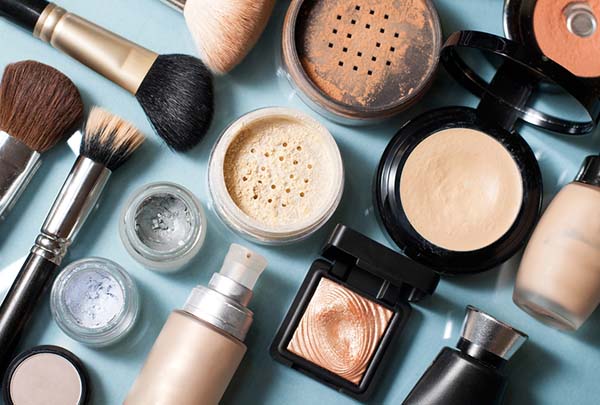If you are currently using expired beauty products the chances are you’re not alone. In fact, it’s a habit many of us are guilty of. A 2013 study by the International Journal of Cosmetic Science found that more than 97 per cent of the study’s participants were either currently using or had used expired make-up. A sample collection of participants’ make-up found 70 per cent currently owned some expired products.
While keeping that favourite eyeliner might seem completely harmless, experts say that expired make-up isn’t quite as innocent as we would like to believe. Unfortunately, the number of germs and micro-organisms increase every day after the expiration date passes. The same 2013 study revealed that the expired beauty products were contaminated with a high level of pathogenic micro-organisms.
In 2015, the Biomedical Science department at London Metropolitan University decided to find out exactly what dangers lurk in our beauty bags and what happens when you use expired make-up. The results were alarming. Not one, but six different types of bacteria were found on five types of cosmetics, including foundation, lip gloss and lipstick. Bacteria found in the samples included eubacterium, which can cause bacterial vaginosis; aeromonas, which causes gastroenteritis and other infections; aeromonastaphlyoccocus epidermidis, an antibiotic-resistant bacteria that can pose health problems for those with compromised immune systems; propionibacterium, known to cause acne and other skin conditions; and enterobacter, which can cause urinary and respiratory tract infections.
Quickly rummaging through your cosmetics bag and disposing of anything that is expired doesn’t always offer a solution: locating an expiration date on cosmetics can be a fruitless exercise. Cosmetics sold in the European Union with a shelf life of less than 30 months must include a Period After Opening (PAO) symbol – a small open jar with a number followed by a number and the letter “M” to indicate how many months the product can be safely used for. Although a large percentage of beauty products on the market in Australia and New Zealand also feature a PAO symbol, labelling laws Down Under don’t require most cosmetics and skincare products to carry expiry dates.
Make over you make-up
Due to the lack of regulation surrounding expiry dates, keeping your beauty cabinet safe can be a tricky task, and unless you use the PAO symbol to keep track of exactly when products were opened and when they’re due to expire – labelling the bottom of skincare or keeping a written log can help – spring cleaning can be a tough task. But it’s not impossible. To streamline your beauty routine and ensure the products you’re using are safe, Wild says we must be ruthless, binning anything that’s expired or looks or smells like it has seen better days.
“Start by laying out all of the make-up you use daily and the make-up you wear on the weekend or for special occasions,” Wild advises. “Organise everything else into categories – mascaras, foundations, eyeliners – and have a rubbish bin on standby.” Wild agrees that even when products do have a PAO symbol on them, it’s not always easy to recall how long you’ve been using a product for and recommends using your sense of sight, touch and smell to assess products.
“A great place to start is to use your senses – if it smells, feels or looks not quite right, it is time to throw it out,” Wild says. “If lipstick feels and looks dry or smells waxy, throw it out. If the pigment of your foundation changes colour or the formula separates and smells off, it’s time to get a new one.”
Keep it clean
Regularly cleaning make-up brushes will not only keep you safe from potentially harmful bacteria, it can also extend the life of products. “Powdered products should last a long time if you use clean make-up brushes, but it’s time to get new powders if they smell or have changed colour and consistency.” Wild explains the same rules can be applied to most make-up: “Discard eye and lip liners if the texture and scent changes.” Wild suggests using the opportunity to not only discard expired product but also to get rid of all those eyeshadows you’ve only ever used once. “Go through all of your make-up products. Do you really need five blue eyeshadows? Keep your favourite and throw the rest out. Use the same technique for other make-up items.”
Have a pen and paper nearby to keep track of expired products you need to replace and Wild says if a label has worn off a product you love, take a photo that you can take into a store to get a replacement.
Good things in storage
Expiration dates should only ever be used as a rule of thumb: air, heat and exposure to bacteria affect all products once they are opened, but incorrectly stored cosmetics and skincare can deteriorate much quicker. Light, humidity and moisture, air and heat will age a product faster. While extreme temperatures are unlikely to have too much of an impact on solid products such as eyeshadows and blushes, heat and cold can have a negative effect on liquid formulations – particularly those with active ingredients.
Creams and foundations can separate after being stored at high temperatures. To extend the life of your products and ensure they remain efficient and safe, store products out of direct sunlight. When storing make-up think about the temperature at department stores, pharmacies, and speciality stores.
Always think twice before using products, particularly skincare and sunscreen, that have been exposed to extreme temperatures or stored in your car. Anti-ageing ingredients including retinoids and other antioxidants become unstable and efficacy is compromised, and sunscreen that has been left in the heat could fail to work.
Brush it up: how to clean your make-up brushes
Cosmetics and skincare aren’t the only places where bacteria are likely to set up home: make-up brushes and sponges are a perfect place for potentially harmful bugs to thrive. Unclean, they can contribute to a number of unwanted skin problems. Irritation, acne, rashes, bacterial skin infections and eye infections are just a few of the problems that can occur if you don’t clean your brushes regularly. You should deep clean your make-up brushes once or twice a week depending on how often you use them, what you use them for and what your skin type is.
Brush cleaning sprays will help keep them in good condition, but to give them a deep clean use anti-bacterial soap. Take care not to immerse the head of the brush in water as this can cause brush hairs to come apart from the body of the brush. Once the bristles have been thoroughly rinsed and water runs clear, press out excess moisture. To ensure brushes retain their shape, pat them dry with a towel and then reshape as needed. Avoid leaving brushes resting on a towel as they won’t dry properly and can gather mildew.
Now that you know what happens when you use expired make-up, find out exactly how long you should keep beauty products for before throwing them out right here.







